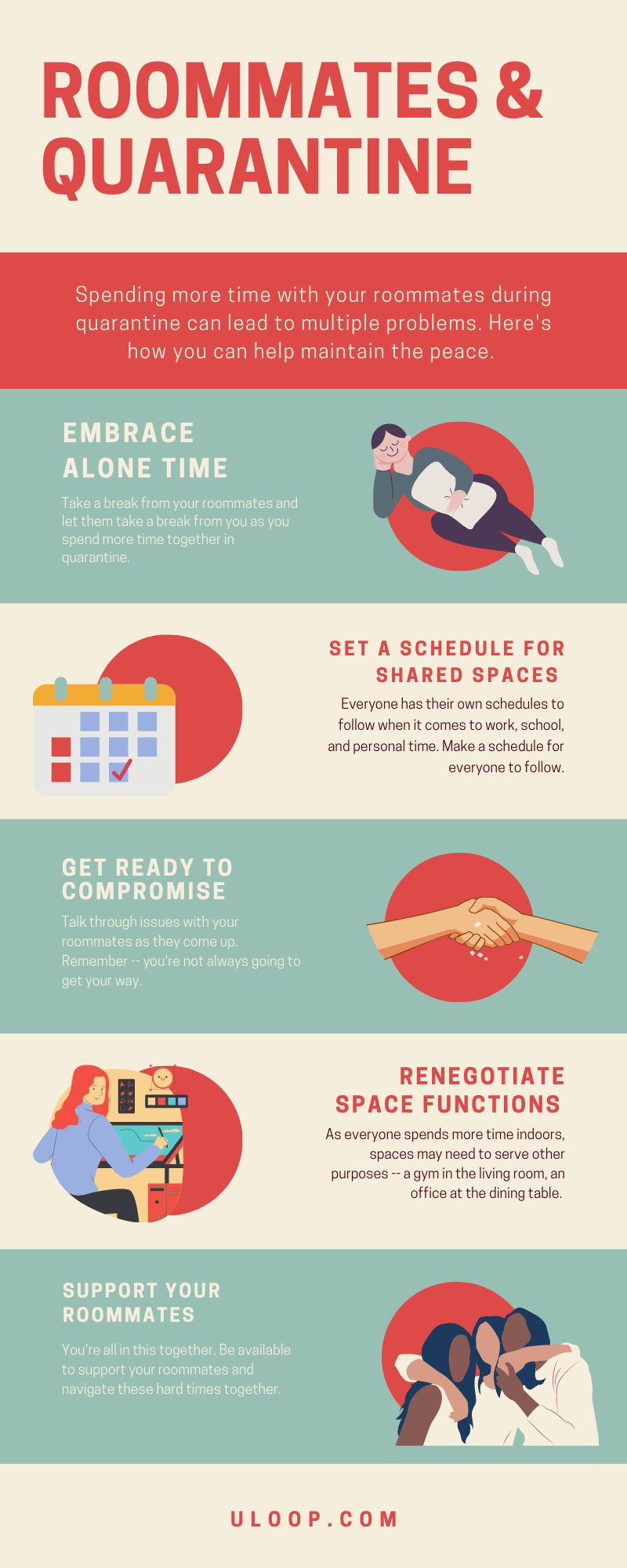Tips for Maintaining the Peace With Your Roommates While Living in Quarantine & Close Quarters
You may have heard of your typical college roommate horror stories, but you never could have anticipated the stories that come from living with your roommates during the coronavirus-mandated quarantine. While plenty of college students opted to pack up their belongings and move back home with family, ongoing apartment leases and other factors led to many college students staying in their shared apartments as lockdowns were placed across the United States. Thus, many students spent a lot more time with their college roommates than they ever could have anticipated during quarantine.
While states are in varying stages of their reopening plans, most people are still encouraged to stay home and away from those outside of their households as much as possible. So, it should not come as a surprise that roommates are at wit's end when it comes to surviving even more time in close quarters with their roommates. As the pandemic goes on, keep these tips for maintaining the peace with your roommates while living in quarantine and close quarters in mind.

Photo: Pexels
1. Embrace alone time in your shared living space
While quarantine can make many seek companionship and human interaction, there is also the ever-present need for quality alone time. When you are sharing a living space with at least one other person, that alone time can be pretty hard to find.
Alone time could have come to a lot easier pre-quarantine. With roommates likely to have different school, work, and social time commitments, you were more likely to find alone time in your room without interruption. However, now that everyone is home for quarantine, that alone time is suddenly rare -- and that change can cause some unwanted arguments between roommates.
If not having proper alone time is getting to you, communicate that with your roommates. For example, you may be lounging around catching up on a TV show when your roommate barrels into the room to join you. To them, you were likely doing nothing and there is absolutely no harm in joining you. However, to you, the interruption can bring an abrupt end to the alone time -- no conversation, no thinking, just you -- you had been waiting for all day.
If this is the case, talk to your roommate to let them know that while you appreciate their company, you just need some alone time. If you think they are going to take it the wrong way, suggest a later time where you can hang out, whether it is in a few hours or the next day when both of you are free.
2. Set a schedule for shared living spaces
Regardless of how much square feet your apartment may offer, quarantine can make any space feel cramped when you have roommates. Shared living spaces, in particular, can feel cramped and cause problems between roommates as roommates battle out who can use space at what times.
As mentioned previously, sharing common spaces could have been no problem at all pre-quarantine if you and your roommates were running on different schedules. One roommate could have been an early riser and made use of common spaces before anyone else got up, but now that everyone's somewhat on the same schedule, that person is competing with everyone else for the same space.
If you and your roommates are currently working or taking classes, take those time blocks into consideration when making a schedule. You don't need to have a strict schedule for every single shared space, but you want everyone to be aware of how they are using shared spaces and feel like they have an equal right to shared space.
While you (or another roommate) may think that because space is shared, anyone can use it at any given time. However, being in quarantine changes that narration a bit. Let's say one roommate wants to workout. While they would typically go to the gym for their workout, they are forced to do that at home now that gyms are closed or they feel unsafe returning to the gym amid the pandemic. They may want to complete that workout in a shared space -- the outdoor patio, the living room, and so on -- because it has the most space available. Rather than putting up an argument that everyone should use the room whenever they want (like watching TV), be more considerate and make a schedule. For example, issue an hour or two where the roommate can have the entire living room space for their at-home workout without disturbance. For the rest of the day, the TV can be up for grabs for everyone else.
3. Get ready to compromise like never before
A large part of maintaining peace with your roommates while living in such close quarters is everyone's ability to compromise. While you may have been able to share your apartment with no problems prior to quarantine, it is unlikely that you will continue through the quarantine without issue. It can be something as small as one roommate not picking up after themselves to arguing about who can use what space at what times. Quarantining with roommates can seriously challenge your ability to compromise.
In an ideal world, everyone can go about their day without breaching on someone else's space. Unfortunately, this ideal situation is fairly unlikely. Everyone has their own preferences on when to cook, clean, work, and study. Some of these are due to personal preferences, but others are shaped by schedules set for them -- work meetings, class times, and so on. These "fixed" times should be respected first and foremost. Yes, it may be inconvenient to be a little quieter while your roommates are on an important video call for class or work, but just put yourself in their shoes.
They likely don't want to inconvenience you any more than what is necessary. Be ready to compromise as you all have to work around everyone's time commitments as you share the same space. Do not be afraid to look back at compromises made and reevaluating their worth to you and your roommates.
Maybe a month ago you all agreed that your roommate could use the living room to skype with her friends for a few hours on the weekends. But now, that same roommate is pretty much taking over the living room for an entire day to skype with her friends, making it inconvenient and near impossible for any other roommate to use the space. Call for a roommate meeting and express your concerns. Either ask your roommate if she can do a different day or let her know that you and your other roommates want to use the living room but can't due to her long skype calls. Emphasize that while you want her to have that time to hang out with her friends, you and your roommates also want some time to enjoy the living room as well.
Of course, this is just one of many conversations you can have when it comes to compromising with your roommates, but it can be applied to multiple situations.
4. Renegotiate space functions
As everyone is still adjusting to their "new normal," it is only right that part of that adjustment is seen in their living space. People are spending more time than ever before in their indoor spaces -- to relax, study, and work. The spaces that your roommates are used to having to tend to areas of their life are no longer there: exercising at gyms, working in an office, studying in cafes and libraries, watching movies at their friends' apartments, and so on.
Thus, your roommates are going to likely want to continue those activities, or have to complete those activities, in the space that your apartment provides. Home workouts, Zoom meetings in rooms, studying on the dining table because that is where the better internet connection is. Your roommates are likely going to be using more space than their rooms can provide, whether their bedrooms are shared or not. To remedy this issue of needing more space, you will want to reevaluate the function of your shared spaces and see how they can work better for everyone as they adjust to their new normal.
For example, your living room can double as a home gym for you and your roommates. Rather than keeping the space as is, you may want to refigure the space so that you and your roommates can make the most of it. This may mean moving a coffee table off to the side or rearranging the sofa and chairs to maximize floor space for daily yoga and stretches. Or, you can create a "workout station" in your living room. When you are not leaving the house as often in quarantine, you likely won't need a variety of shoes by the doorway. Instead, repurpose your shoe rack into a "workout station." Use it to store any yoga mats, weights, resistance bands, and workout gear that you will need during at-home workouts.
If repurposing your living room into a home gym is not in the cards for you and your roommates, you may consider changing your dining room into a work station. With your roommates being forced to work from home, whether for a job or school, they no longer have access to the workspaces they are used to. Some roommates may not have adequate desk spaces or good connections in their personal rooms. To remedy this issue, transform your dining table into a work station for everyone to use. To avoid arguments about separating work, make a schedule. Establish that the dining table can be used for efficient work from a set number of hours, like from 7 a.m. to 5 p.m. After 5 p.m., anyone is free to use the dining area as they wish. To avoid things getting too messy or having work/study items all over the apartment, get a cabinet or bookshelf used to store everyone's belongings in "off hours." Each person can have their own cubby or shelf to store laptops, cords, notebooks, and other supplies while not in use.
5. Be available and offer support to your roommates
Truth is, everyone is struggling right now. Just think about how you are dealing with the coronavirus pandemic and how it is impacted your life. You may be out of a job, or unable to fly back home to see your family. Your roommates are also dealing with their own life changes due to the coronavirus. This is a time to be empathetic, understanding, and supportive.
Regardless of how close you are to your current roommates, you like all have a separate support system outside of your living space. For some, it is their family. For others, it is their outside friend circles. Quarantine is likely taking away these support systems. While they can call or text their friends and family, it is not the same as face-to-face interaction that many are craving right now.
As lonely or unsure you are feeling, your roommates are likely feeling the same way as they adjust to quarantine and the changes caused by the coronavirus pandemic. Be supportive of your roommates. This does not mean that you need to take on all their troubles and always be on-call to hear their struggles, but check in with them to see how they are coping and if there is anything you can do to help them. You would be surprised how much an unplanned movie night or night of destressing with board games with all your roommates. Not only does it give you the chance to take your mind off of your personal struggles, you can also let one another know you are there for each other.

Photo: Pexels
Living with roommates in quarantine and in close quarters can cause multiple conflicts, it is nearly inevitable. However, with these tips in mind, you can take tips to prevent unnecessary conflicts between roommates and instead focus on helping each other cope through quarantine and major life changes.

Interested in using our roommate matching formula to find the perfect college roommate for you? Create a profile & take the roommate quiz on Roomsurf! Get Started
